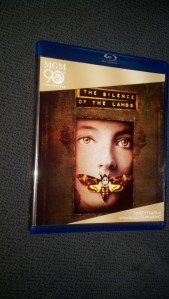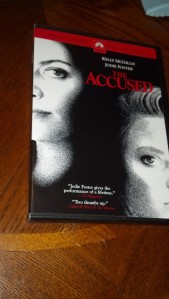The Task: Watch and write about every movie on my shelf, in order (Blu-rays are sorted after DVDs), by June 10, 2015. Remaining movies: 19 Days to go: 15
Movie #421: The Silence of the Lambs
There are a lot of things that could be said about The Silence of the Lambs, of course, but I will start with a very small, yet very huge observation. And that is, The Silence of the Lambs was the first movie I remember to address the sexism that no one acknowledges — to take a feminist stand on an item so innocuous as to seem trivial, yet which held huge importance not only in the training of Clarice (Jodie Foster) and her relationship with Crawford (Scott Glenn), but in the way all women everywhere deserve to be treated — not as lesser, more sensitive beings, in need of protection, but as equals in competence and authority.
The moment in question is when Clarice accompanies Crawford to a small town, where another victim of serial killer Buffalo Bill has turned up. In an effort to, as he says, get the local authorities out of the way, Crawford makes some whispered remonstrations about discussing details of a graphic and sexual criminal nature in front of the lady present, indicating Clarice. She says nothing about it at the time, of course, because that would be unprofessional, but he notices her displeasure and when he asks her about it later she tells him plainly, “It matters. Cops look at you to see how to act. It matters.” And that’s it. He understands exactly what she’s saying and he seems to take it to heart. It’s a moment so small you could hardly notice it in between all of the so-called psychological thriller aspects of the rest of the film, but it stands out to me in a huge way. It’s not just that this is a woman standing her ground on how she expects to be treated by a colleague, this is a trainee speaking up to her superior on the subject. And it’s not concerning an instance of easily identifiable sexism, such as harassment or humiliation or assault. It’s a moment of what many would deem polite consideration, and yet it undermines her position as an officer of the law and an authority figure, and she knows it does. She doesn’t make a big deal about it, but she clearly states her case, a champion for women everywhere to stand up and be respected in their fields, not coddled like children.
Clarice Starling is one of the greatest female characters ever, and it’s because of moments like that. It’s also because of her calm demeanor in the face of clear discomfort meeting with Dr. Lecter (Anthony Hopkins). He has a reputation as a monster, obviously, and he speaks in an unsettling manner about unsettling things, and yet she exudes a sort of fearlessness with him. She’s open with him, establishes trust with him, and she’s not coy or embarrassed when he asks about potentially embarrassing things (like making her repeat what the other inmate said to her — “I can smell your cunt.” — and asking about the possibility of sexual intrigue with Crawford). He tries to disarm her, yet she stands her ground beautifully without seeming any less human. On the contrary, Clarice opens up about herself and her past that makes her all the more human and less like an automaton of the criminal justice system. These prying moments into her most painful memories still don’t deter her, though, any more than Lecter’s cryptic pronouncements or riddled clues. And Clarice, after all, is the one who truly solves the mystery of Jame Gumb (Ted Levine), takes him down single-handedly in a pitch black house of horrors, and saves Catherine Martin (Brooke Smith). She’s the hero of the film, no question, yet it’s kind of a showcase for subtly strong women all around, despite Lecter’s showier role. Remember, it’s Clarice’s friend and fellow student Ardelia (Kasi Lemmons) who helps her work out that Buffalo Bill knew his first victim, and Catherine Martin herself who comes up with the plan to make a hostage out of Precious the dog, and even Catherine’s mom Senator Ruth Martin (Diane Baker) who won’t put up with Lecter’s sick gameplay when almost everyone else indulges it because they know he’s toying with them. Chicks positively rule this movie.
Lecter is the more sensationalized, shocking, fabulously gruesome character, though. I’d be lying if I didn’t say his character stands out as one of the more memorable and terrifying of all time. And yes, if I’m going to quote a line from this movie, it’s almost certainly one of his (except for the memorable “It rubs the lotion on its skin,” etc. and the extra creepy “Would you fuck me? I’d fuck me.”). But I’ll also admit that I find it extraordinary that Hannibal Lecter just so happens to have known Buffalo Bill when he was a fledgling killer. It stretches the limits of my suspension of disbelief even further than a woman suit with giant diamond cut-out sections does.
Beyond that, though, I think the movie is fantastic. Every eerie, carefully controlled frame of it.


